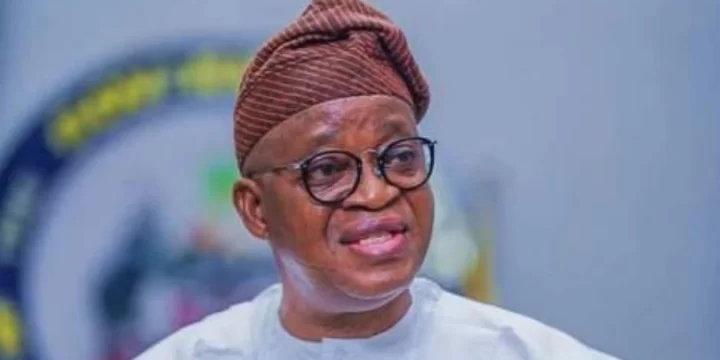The Federal Government has reiterated its determination to transform Nigeria’s maritime sector into a modern, globally competitive industry that will contribute significantly to economic growth. Minister of Marine and Blue Economy, Adegboyega Oyetola, made this known while addressing stakeholders at a strategic maritime industry engagement in Lagos on Monday.
Oyetola said the government is committed to implementing policies and reforms that will reposition the sector, attract investments, and ensure that Nigeria fully harnesses its vast maritime potential. According to him, President Bola Tinubu’s administration sees the maritime industry as a strategic pillar for revenue generation, job creation, and economic diversification.

“The maritime sector is central to our economic renewal agenda. It is our duty to create a modern system that meets international standards, eliminates inefficiencies, and positions Nigeria as a hub for shipping and trade in Africa,” the minister said.
He explained that Nigeria, with its vast coastline of over 853 kilometers and strategic location along the Gulf of Guinea, has all it takes to become a regional leader in maritime trade and logistics. He added that with the creation of the Ministry of Marine and Blue Economy, the government now has a clear institutional framework to unlock the sector’s potential.
Oyetola outlined some of the government’s priorities, including the modernization of ports, full digitalization of cargo clearance processes, improvement of inland waterways transportation, and enhanced security along Nigeria’s waterways. He noted that these reforms would reduce congestion, cut costs for traders, and boost Nigeria’s competitiveness on the global stage.
The minister also emphasized the importance of private sector participation in driving the industry’s growth. He urged investors, shipping companies, and logistics operators to partner with government agencies in upgrading infrastructure, providing modern vessels, and expanding training opportunities for seafarers.
“The government cannot do it alone. A modern maritime sector requires strong partnerships between the public and private sectors. We are therefore committed to creating an enabling environment that supports investment, innovation, and sustainable growth,” Oyetola stated.
He assured stakeholders that ongoing reforms would focus on transparency, accountability, and the elimination of bottlenecks that have long hampered efficiency in the sector. According to him, the Federal Government is working with the Nigerian Ports Authority (NPA), Nigerian Maritime Administration and Safety Agency (NIMASA), and the Nigerian Shippers’ Council (NSC) to streamline regulations and improve service delivery.
Industry stakeholders who attended the forum welcomed the government’s renewed commitment but stressed the need for consistent implementation of reforms. They noted that previous administrations had unveiled ambitious maritime policies that were either poorly executed or abandoned midway.
The President of the Nigerian Shipowners Association (NISA), Dr. MkGeorge Onyung, commended the minister for his vision and pledged that shipowners would support initiatives aimed at building capacity and improving shipping operations. He however urged the government to address challenges such as access to finance, multiple taxation, and high port charges, which continue to frustrate operators.
Similarly, representatives of freight forwarders and clearing agents called for an urgent review of port processes to reduce delays and make cargo clearance more efficient. They argued that the success of the blue economy agenda would depend largely on how quickly the government addresses the issues that increase the cost of doing business at Nigerian ports.
Maritime experts at the event also highlighted the role of human capital development in building a modern sector. They called on the government to invest in training for seafarers, port workers, and regulatory officers to ensure that Nigeria meets global standards in shipping, safety, and environmental protection.
Oyetola in his remarks assured that the ministry would place strong emphasis on manpower training, research, and technology adoption. He explained that embracing innovation is critical to achieving sustainability and ensuring that Nigeria does not lag behind in global shipping practices.
Security, he added, would remain a top priority in government plans. He recalled that Nigeria recently exited the International Maritime Bureau’s piracy red list following improved surveillance and the success of the Deep Blue Project. The minister said sustaining these achievements is key to boosting investor confidence and ensuring safe maritime operations.
He also stressed the importance of environmental sustainability in line with global climate goals. According to him, Nigeria will align its maritime policies with international conventions that promote greener shipping, cleaner oceans, and responsible exploitation of marine resources.
As part of long-term plans, Oyetola said the ministry will strengthen collaboration with regional and international bodies to promote trade, enhance security, and attract funding for infrastructure. He noted that Nigeria’s maritime sector, if fully developed, could rival oil in terms of revenue contribution.
Concluding his remarks, the minister reaffirmed the Federal Government’s commitment to ensuring that the maritime sector plays a central role in the Renewed Hope Agenda. He said the journey toward building a modern industry may be challenging, but with the right policies, partnerships, and determination, Nigeria is on track to becoming a global maritime powerhouse.
Stakeholders left the event optimistic that with sustained reforms and clear political will, the vision of a modern, efficient, and competitive maritime sector in Nigeria could soon become a reality.
Support InfoStride News' Credible Journalism: Only credible journalism can guarantee a fair, accountable and transparent society, including democracy and government. It involves a lot of efforts and money. We need your support. Click here to Donate
